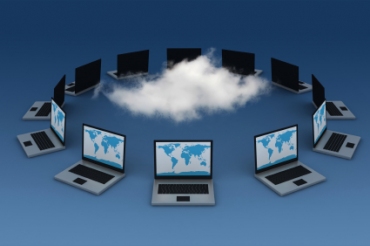Cloud computing is transforming business office systems, but what is it, and how can it help you? Read on to find out!

The Cloud Explained
Very simply, cloud computing is an on-demand service allowing you to access programs and store data over the internet from remote servers rather than from your hard drive or in-house servers. In business, users can access SaaS (Software as a Service) IaaS Infrastructure as a Service) or PaaS (Platform as a Service), each of which replace traditional hardware, programmes, and systems.
SaaS refers to a software application such as used over the internet, such as a Microsoft Office 365. IaaS is a virtual computer infrastructure, enabling you to use web based infrastructure such as IP addresses and file based storage; Amazon EC2 for example. Finally, PaaS provides you with the platforms to work on, your operating system, including the network systems and servers needed to host applications.
Why Use the Cloud?
The reasons that so many businesses are turning to the cloud are numerous, with cost and flexibility the most common motivating factor to use cloud based computing. So why switch? Here are some of the chief benefits:
- Firstly, cloud based computing is very easily scalable, so users are only playing for what they need. For example, if you need extra bandwidth or storage for peak times, you’ll only pay for the time it’s used, in exactly the same way as any utility.
- Switching is easily managed without the need for costly investment in hardware, and so instead of spending capital on computer infrastructure, costs become operational and as a result, easier to predict and justify.
- Cloud based platforms can be accessed from anywhere by remote workers, enabling each employee to work from and on the same platforms and documents, and allowing easy collaboration.
- Updates and renewals are no longer necessary. This is handled by the cloud vendor.
- Cloud based IT services have inbuilt disaster recovery capacity and data backup. However, If you’re working on the cloud http://www.itwiser.co.uk/ recommend making sure it backs up all of your systems, servers and network folders as well as your data.
- Increased storage capacity
The benefits, then, are far reaching. But what are the downsides?
- Security and vulnerability are the principle concerns of businesses using cloud based services, as customer information security and compliance may be compromised. This is due to the fact that data is stored remotely and access to secure information on just one platform can be easily leaked to the world.
So to be protected from unauthorised users, there needs to be robust security in place, yet this is left in the hands of the cloud vendor and is out of the users own control.
- Businesses will also be highly dependent on internet speeds and reliability, as well as the reliability of the cloud vendor. Outages can occur.
- Choosing a new vendor can be an issue as transferring to another is complex.
Wendy Lin is an entrepreneur and technology guru. She enjoys being a guest blogger and prides herself in knowing the latest technology before her teenage children since she is a tech tester for many blogs.


Informative article, totally what I needed.